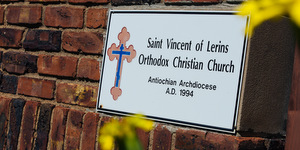Ash Wednesday, Our Journey to Lent Begins | Omaha Churches
March 17 is the Feast of St Patrick of Ireland, also known as St Patrick’s Day. And for many, all it means is that it is a time to wear certain colored clothes, eat suspiciously ethnic food such as Irish Nachos, and consume lots of green Beer. Yet while many will be bar hopping on this day, Western Orthodox Christians will be celebrating the event in a different way.
This particular year, March 17 also marks in the Orthodox Calendar, Ash Wednesday, the beginning of Lent. So, while the world will be partying, the Orthodox will be beginning a time of fasting and penance. One could hardly imagine a greater contrast!
If we intend to follow the Orthodox example, rather than the worldly one, there are things that we should be doing to prepare for this event. The day before Ash Wednesday is anciently known as Shrove Tuesday. While it is now often known as a time eat pancakes, the real meaning behind the day was that the faithful were expected to go to Confession, before the beginning of Lent, to be “shriven’, or absolved of their sins. The eating of pancakes actually came about as it provided a way to use up those things that were not supposed to be eaten in Lent.
The symbolism of the the beginning of Lent continues the next day. Before the Ash Wednesday Mass, palms from the previous year’s Palm Sunday are burned to make ashes. These ashes are blessed at the beginning of the Ash Wednesday service, and placed on the foreheads of the faithful, in the shape of a sign of the cross. This is known as the imposition of the ashes.
As the priest places the ashes on each forehead, he recites the same formula: “Remember O man that though art dust and unto dust shalt thou return.” This is a translation of the last portion of Genesis 3:19: “In the sweat of thy face shalt thou eat bread, till thou return unto the ground; for out of it wast thou taken: for dust thou art, and unto dust shalt thou return.” We are being reminded of our mortality, as well as providing a tangible signal for the beginning of the penitential time of Lent.
A major part of Lent is fasting as abstinence. The guidelines for this in the Western Rite Vicariate are as follows: We are expected to abstain from flesh meats or the juice thereof on every day with the exception of Sundays. Also the number and quantity of meals are restricted. One may eat only one full meal in a day, and that not before twelve o’clock. A collation, or about one-fourth of a meal, is also allowed.
However it should be said that these are not hard and fast rules which must be be obeyed at all costs. They are guidelines, goals to which we should aspire. It is certainly not meant to be harmful. In the words of St John Chrysostom: “If your body is not strong enough to continue fasting all day, no wise man will reprove you; for we serve a gentle and merciful Lord, who expects nothing of us beyond our strength.”
Fasting and abstinence are not an end, in and of themselves, in Lent. Nor is it a diet or a punishment. Rather, it is said by St Leo the Great that they are a means to pure, holy, and spiritual activity. They are a tool, to achieve a good and Holy Lent.
Another resource the church provides are additional services. On weekdays during Lent, the church will often provide additional liturgies for the faithful to attend. Uniquely, each day in Lent is provided with its own propers and readings.
In addition, services such as Stations of the Cross, are conducted, to allow the faithful to be able to spend more time in prayer, and to examine their own lives, based on Christ’s sacrifice on the Cross. These services are designed to help to focus our thinking, and guide our contemplation of the elements leading up to the Resurrection of Our Lord.
The Church also provides a number of resource books to help guide us during our Lenten journey. The time of Lent should not be considered a time of punishment and sorrow. Instead it should be thought of as a time to improve the interior man, that we may find ourselves worthy of Christ’s sacrifice for us. Our goal should be that by the time of Pascha, we should find ourselves closer to God.

